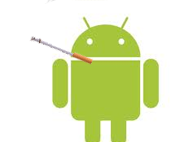Apple, Android apps blamed for teen smoking. Is that so?

According to a new study from the University of Sydney, free apps downloadable from the Apple App Store or Google Play may encourage smoking behavior.

In a truly British fashion, what utter tosh.
We live in a toxic environment. Pollutants from vehicles fill our lungs, we binge drink, and demonize smokers while munching away on that takeaway burger or second donut. If we listened to the UK's Daily Mail, everything from bacon to being a woman (or man), having a bubble bath or wearing flip flops will give us cancer. I need my cancer-inducing coffee -- in spite of the health warning.
But I digress.
Yes, smoking is bad. We smell like an ashtray, we stain our teeth, screw up our lungs, and pay tax through the nose for our nicotine fix, all while enjoying an extra five minutes off work to the scowls of our smoke-free colleagues. However, rather than blaming ourselves or our culture, we go after the 'big, bad' tech firms -- since they are the propagators of the latest trend -- the downloading of apps on to mobile devices.
Applications promote smoking? But there's nothing on social media -- YouTube, blogs, articles, or online games for that matter that could encourage less-than-healthy behavior. What is the world coming to? It's not as if stores sell cigarettes, or even skirt around the law by selling cannabis accessories.
Blame the apps. May the technology gods on high smite tech firms for allowing such things.
The study looked at 107 apps in the Apple App Store and on the Android market -- now known as Google Play -- that contain 700,000 and 600,000 apps respectively. Published in Tobacco Control, the researchers say that "pro-smoking" apps found in both stores could increase teen risk of smoking.
So what's included in the apps? Smoking brands, information on where to buy cigarettes and images of tobacco. Nothing we don't see in our daily lives, hear about or even witness, then.
If someone is enough of an idiot to download an app called "Puff Puff Pass", where the only point of the game is to smoke and pass along a cigarette, they are probably going to smoke either way -- or already do. Simply downloading an app that suggests "Smoking is cool! Look, you gain points and a gold star by pretending to smoke!" is highly unlikely to turn a non-smoker into a 60-a-day addict. (Especially if you live in the U.K. or U.S., the prices are through the roof, no?)
The authors of the paper wrote:
Pro-smoking apps that show that smoking is cool in a cartoon game, and provide a chance to explore the available cigarette brands and even simulate the smoking experience with high quality, free apps could potentially increase teens' risk of smoking initiation.
There are two main points to consider here. First, that "smoking is cool" in a cartoon. South Park includes blood and murder -- and aliens, for some reason -- in every episode -- and yet, I don't think they're cool. I'm not going to immediately feel indoctrinated enough to grab a cleaver and lop off the head of the first person I see. If I walk past a pub and see a person having a beer or cigarette, this tiny thing called "self-control" generally stops me from joining them.
Secondly, you cannot expect to simulate an oral and chemical fixative through an app and then feel the urge to do it in reality. Teenagers smoke because they explore and experiment. Parties, peer pressure, and alcohol use are more likely culprits than a cartoon ashtray that gives you points for the amount of cigarettes you stub out.
If a teenager is going to start smoking, it's more likely that will happen when a group is passing a cigarette behind the bike sheds rather than viewing it on an app and thinking "Yeah! This cartoon is subliminally telling me it's cool, I'll borrow $20 off my parents and do it."
In all fairness, there was one point that the researchers made -- that the content violates the World Health Organization (WHO) convention on tobacco control, which stops the advertising of tobacco promotion across media.
Long gone are the days when children played with fake cigarette packets -- the concern being that this kind of subliminal advertising would make them choose particular brands in later life, prompted by childhood memories of feeling safe, secure and happy.
Promoting alcohol is still fine, don't you worry.
Bottom line: society cannot demonize the app ecosystem due to a few pathetic, pointless applications like "Puff Puff Pass" or "myAshtray". If users find this entertaining, the likelihood is that they already smoke -- rather than they want to download these types of 'entertainment' to see if smoking is actually cool.
Smoking is an individual choice, albeit an unpopular one in this day and age. By pushing the blame on to big-name tech firms and their services, we once again remove the personal responsibility we have for downloading that app, buying those cigarettes, or choosing to smoke with pint in hand -- or outside the school gates just to "fit in".
It's not down to the providers of an online store, no more than it's the kitchen knife manufacturer's fault when a man stabs his wife using the implement. It is an issue laid at the feet of personal choice.